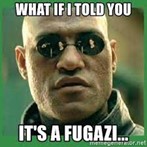Did someone just call your Rolex a "fugazi?" What do they mean? This post unpacks everything you need to know about the meaning and origin of this idiom.
Fugazi Meaning
The word "fugazi" has two uses. The first and more common of the two is to describe something inauthentic or fake.
For instance, if someone tried to pay you for something with a counterfeit dollar bill, the note would be a "fugazi." The saying can apply to almost any valuable object, such as jewelry, coins, high-end sneakers, or any high-value item that is fraudulent or fake.
The word refers to the item's authenticity and shows the other person that you know they cannot con you out of your money.
The second meaning of "fugazi" applies to situations that quickly deteriorate to a bad outcome or appear inauthentic or not as you expect. If you go to an event and it seems that the speaker is not being truthful and looking to sell you something, you could describe them or the event as a fugazi.
Fugazi Example Usage
John: "Check out this Rolex I bought from this guy in the parking lot over there. He only wanted $500 for it!"
Greg: "Do you really think you would get a real Rolex for $500? C'mon man, it's a fugazi for sure."
---
"That diamond necklace is a fugazi, I took it to the jeweler for valuation, and he laughed at me."
"I checked through the applicant's documents, and his university diploma is a fugazi. No one on the faculty ever heard of the guy."
"I looked at the Pokémon card online, but I'm sure it's a fugazi; it doesn't have the correct edge design on the card."


Fugazi Origin
Language experts cannot explain the origin of the word "fugazi" or the exact point when it entered the English language. The term has disputed origins, with some experts thinking it comes from the Italian-American vernacular, with its root in the Italian word, "fugace," meaning "fleeting," the popular phrase "fu cazzo," referring to human excrement.
Other experts insist that the word comes from the Vietnam War and a type of French-manufactured landmine "fougasse," used in the conflict by the Vietcong.
The expression started to gain traction in the late 90s, after the premiere of the gangster movie "Donnie Brasco," featuring Johnny Depp. Donnie meets "Don the Jeweler," played by Al Pacino in the film. Don the Jeweler tries to sell Donnie a ring, but Donnie identifies it as a fake, calling it a "fugazi."
"Fugazi" was also a popular punk rock band in the 1990s, led by frontman "Ian McKay," who claim they got the name of their brand from the Italian-American version of the saying. Matthew McConaughey would also use the phrase in reference to the stock market in the 2013 film, the Wolf of Wall Street.
Phrases Similar to Fugazi
- Fake.
- Inauthentic.
- Imposter
Phrases Opposite to Fugazi
- Authentic.
- Genuine.
- The real Mcoy.
What is the Correct Saying?
- Fugazi.
Ways People May Say Fugazi Incorrectly
"Fugazi" is a word meaning imposter, fake, inauthentic, or a copy of an original. Some people may incorrectly pronounce the word "foo-gar-zee" instead of the more traditional "foo-gay-zee." Using the term to describe anything genuine or authentic is the incorrect use of the word.
Acceptable Ways to Phrase Fugazi
You can use the term “fugazi” when referring to objects, situations, and people that seem fake or suspect. Most people will understand the word's meaning, as it's a popular phrase in many movies, like "Donnie Brasco." Fugazi suits professional and social use, and it's a way of describing something as a good or bad copy, inauthentic, or fake.